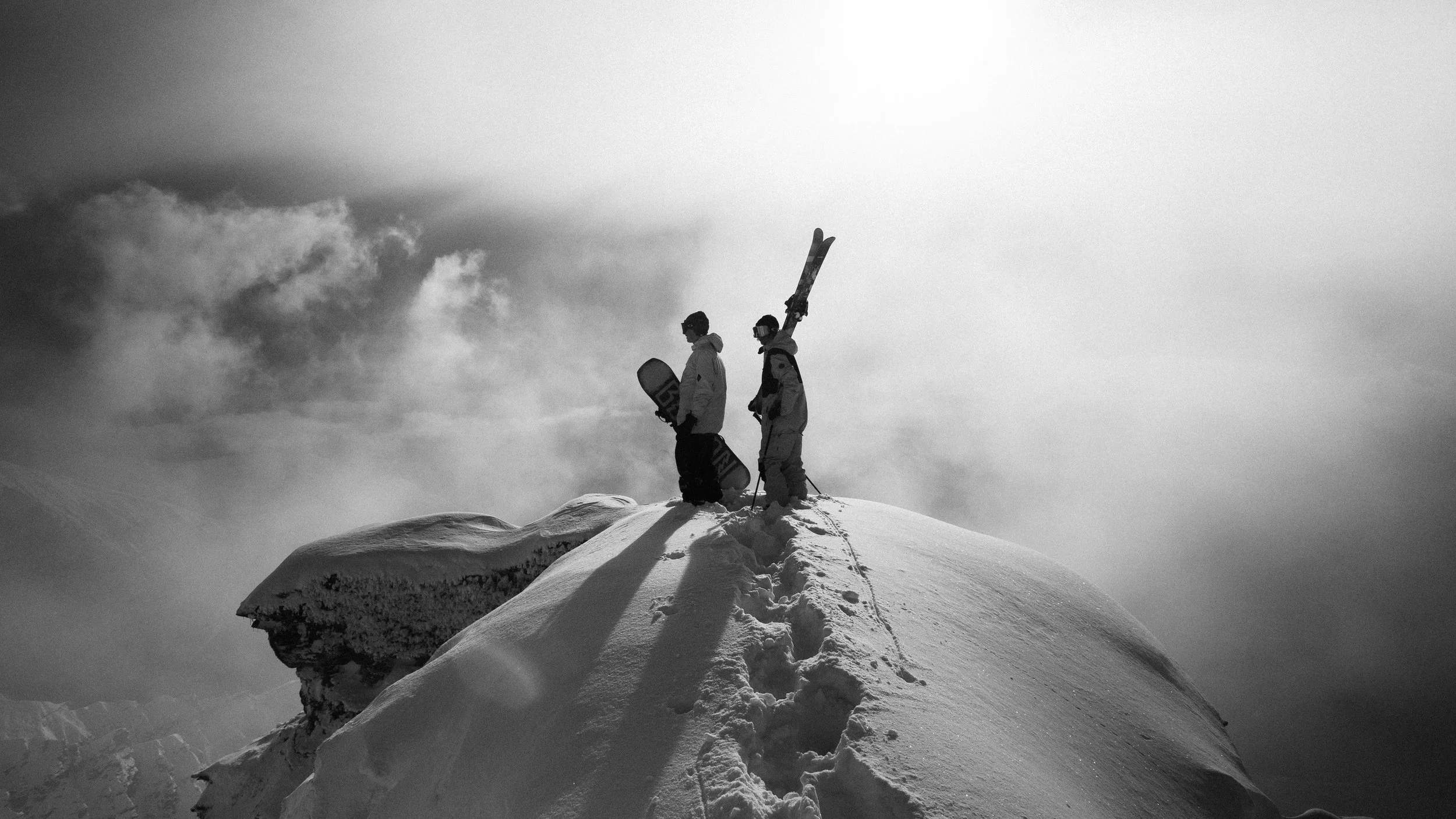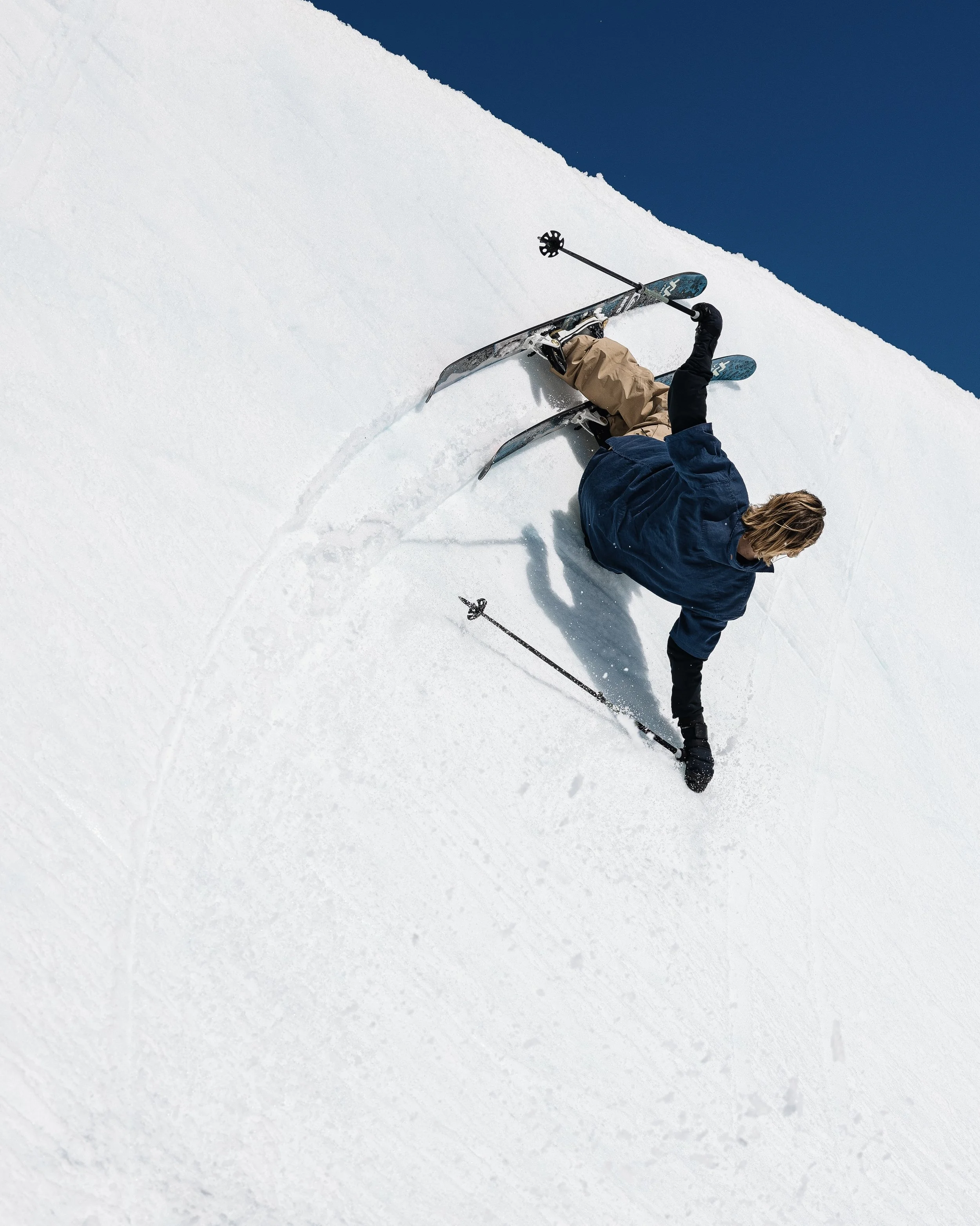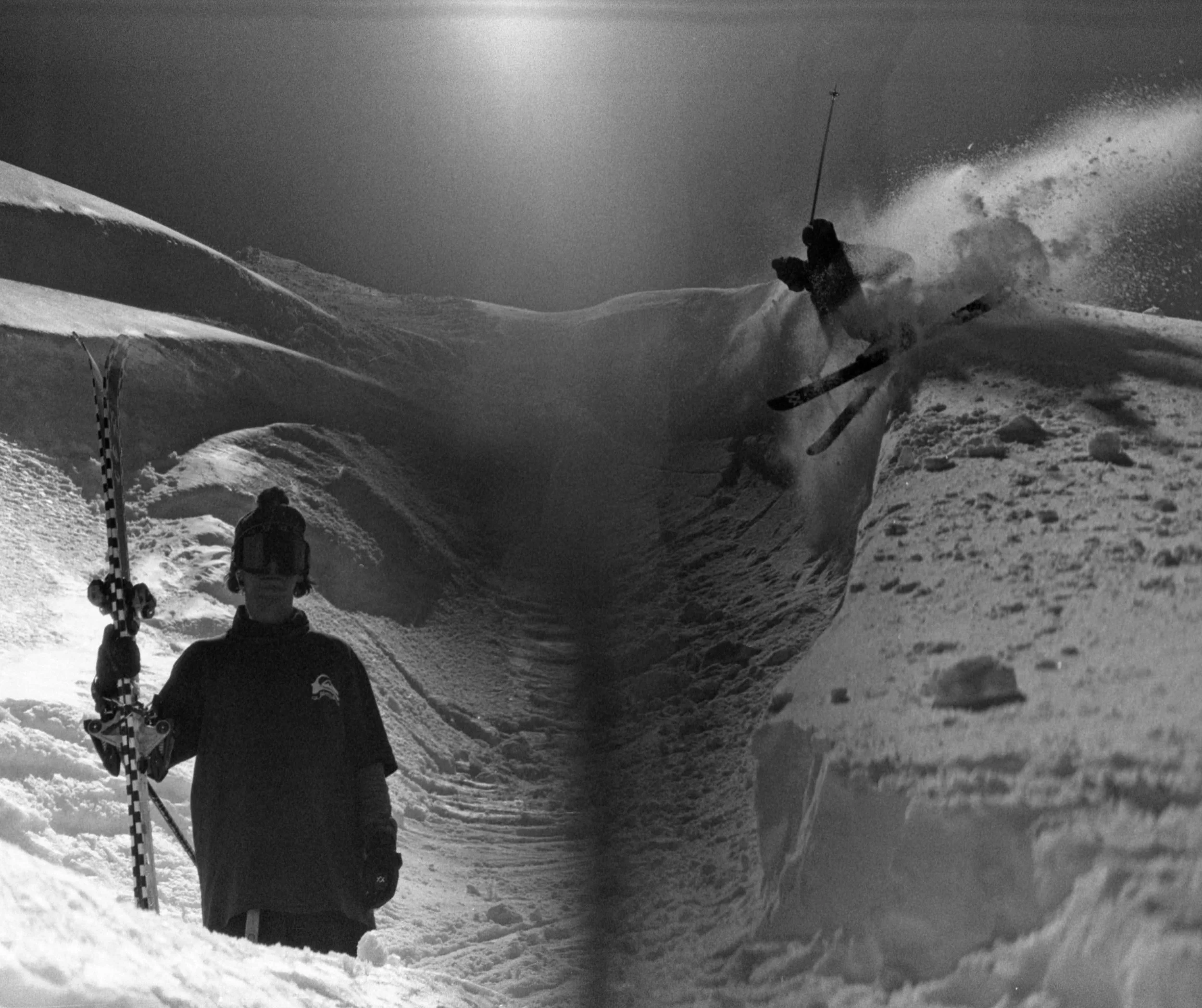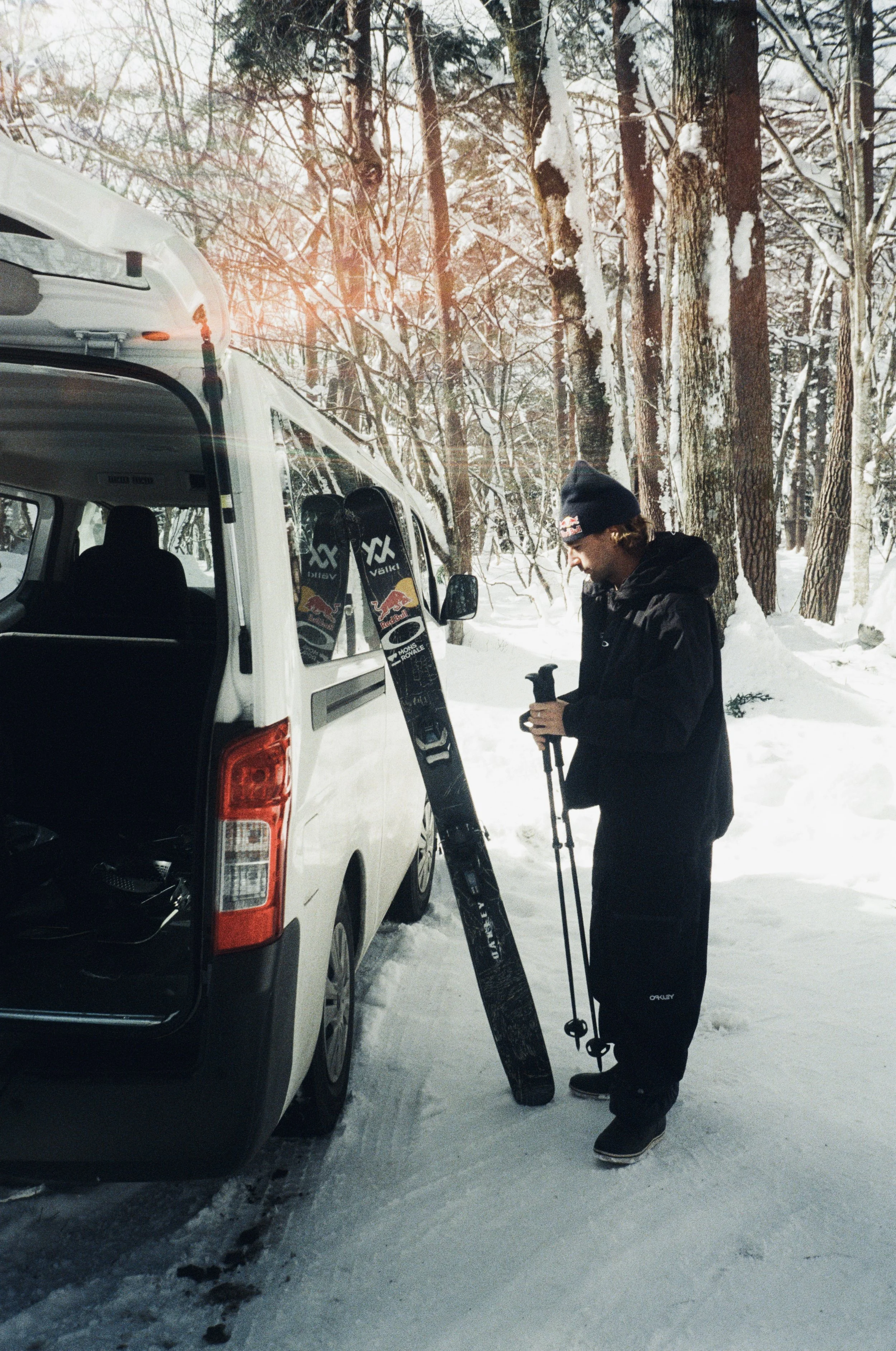Getting Your Head in the Game with Finn Bilous
Words by Rosa-Lee O'Reilly.
Photography by Tom Fisher, Jackson Lana, Daniel Loosli and Theo Acworth.
For many of us, sport is a physical act. It’s about speed, precision, and high performance. But what happens when you pull back the curtain and zoom in on the internal world of an elite athlete? I think what we’ll find is that strength isn’t only about power, but also about softness, vulnerability, and mental tenacity.
In conversation with New Zealand-born Olympic skier Finn Bilous, we unpack the quieter side of an adrenaline-fueled life. While he's often seen chasing snow across hemispheres, there's another layer to the story: one grounded in joy, exhaustion, routine, and the mental strength it takes to keep showing up—and still love what you do.
R: With a lifestyle sport like yours, you’re what most people would call “living the dream”—travelling the world, skiing some of the most insane terrain. But I know skiing every day can take the joy out of it. Skiing is your profession, but it started out as something a lot simpler. What keeps the fun and passion alive after all these years?
F: I still don’t see it as a job, which is kind of crazy, because it has been mine for over ten years now. But I’d still be skiing every day even if I weren’t sponsored or competing. It’s what I’d spend my money on. People in my community are the type of people I want to spend my time with. Growing up in a skiing family, it started as a fun, family activity. My entry into the contest world was quite unconventional, which I think helped keep things fresh. I try to prioritise skiing with no strings attached—just for the fun of it.
R: You certainly live a life of pleasure and healthy hedonism. But what brings you joy when you’re not backflipping off Treble Cone?
F: The most significant contrast to skiing for me is surfing. Skiing is so high-impact—it’s hard on your body. Surfing’s the opposite. It’s slower, more meditative. You’ve got to wait out back for a wave. There’s patience in it. You can’t control the conditions. When it all aligns, it’s fleeting and spiritual. That’s been a massive part of decompressing for me after back-to-back winters for so many years. Reaching the ocean has become increasingly important. In winter, I feel like I’m hunched over skiing all the time. In summer, I get into the water, and my shoulders open up. As does my mind.
R: I love that metaphor. With surfing, you have no control—it’s nature. The ocean decides when the wave comes. But with skiing, everything is set up for you. The slope is man-made, the conditions prepped. So you’re in performance mode. There’s a constant pressure in winter, and then a letting go when summer and the ocean roll around.
F: Exactly. There’s so much contrast; total yin and yang. In winter, you’re indoors a lot. Summer, you’re outside; even the food changes. The people change. That rhythm feels natural. I’ve lived most of my life in winter, but now I try to carve out summertime between seasons, to create that consistency of contrast and perspective. When I’m in ski towns, people think I’m living the dream. Then I meet surfers and they’re like, "That sounds awful—I wouldn’t even do one winter!" They’ve never seen snow, and they just don’t get it, which is actually really refreshing.
R: We often associate sport with the body. But it’s so mental. The body does the thing, but the mind gets you there. It’s your mind that does all the preparation and strategy. Do you have any pre-game rituals to get your head in the game?
F: Yeah, it’s funny, I like to view the preparation and strategy almost like having different internal batteries. There is your year-long battery, your seasonal one, then monthly, weekly, and daily. Heading into Northern Hemisphere winter, I’m usually fully charged—but I burn through it all and then need to recharge again. On a smaller scale, I think we all have tendencies to do the same on a monthly, weekly & daily schedule. So I’ve started being more intentional with how I schedule the year. It’s easy to say yes to one more shoot or contest—even when you’re knackered. But that’s when accidents happen. Knowing when to pump the brakes is massive. I’ve also built a big pre-game routine for comp or film days to minimise decisions in the morning. Gear is prepped for the night before, and food is sorted. All the basics handled. That frees me up to focus on the intensity of the moment to mentally visualise what’s ahead. Instead of stressing out in the morning and being like, “Oh shit, I’ve got no eggs!”
R: That reminds me of Atomic Habits by James Clear. He talks about small habits. For instance, having eggs ensures your brain has the space to think about more important things, such as an avalanche that may occur later that day.
F: For sure. There’s so much in sport about tapping into those states of flow. All of those little things add up. Being in the present moment is everything, but even small decisions can pull you out of that space. The more I can stay connected to that, the better. That’s the mindset I want to be in when I’m skiing—completely present, fully connected to what’s happening around me, and able to make the best decisions in the moment.
R: Has there ever been a comp or shoot where you had a lot going on outside of sport, and your head just wasn’t in it?
F: Yeah, for sure. Skiing has always had this crazy way of letting me find flow, even when life is chaotic. But I’ve learned to compartmentalise. Not to ignore things, but to be like: “Okay, I’ve got to put that in a box today or it’s going to mess with my riding.” That ability to switch is a skill I’ve learned through sport. There have been times when life was overwhelming. But that’s life, right? When it rains, it pours. And you’ve just got to wait out the storm until it’s sunny again.
R: Do you think athletes are underestimated in that way?
F: Totally. People participating in extreme sports must be innovative. You’ve got to think differently, stay open, be malleable. Especially at the elite level, you really start tapping into your psyche. That mental work is bigger than just sport—it carries into how you do life. Learning to trigger those peak performance states is huge. I don’t think it’s necessarily healthy to live in that mode all the time, but it’s powerful to know how to get there. It’s a hard balance in high-performance environments. You’re trained to be amazing at one thing, but that can come at a cost. I’d say athletes are incredibly mentally strong, but maybe also more fragile in other areas.
R: That can be isolating, too. You’re literally put on a pedestal. How do you stay mentally well outside of sport?
F: Community is huge. Everyone needs to feel like they belong. That’s why I always come back to Wānaka. The relationships I have here were established a long time ago and are far more meaningful to me than any sort of notoriety I may have gained through sport.
R: Would you say Wānaka is your happy place?
F: Definitely. But I also think it’s a place where I often retreat to regain perspective. Wānaka, like many ski towns, has become extremely affluent and relatively privileged. I’m very fortunate to live here, but sometimes I find that affluence can feel uncomfortable, given my awareness of the far more serious issues people face throughout the world. Travelling to places like Indonesia and those remote islands where people have so little, but the level of stoke fulfilment and community is so high. You realise what actually matters. That type of happiness and belonging beats a brand-new boat on Lake Wānaka any day in my eyes, haha.
R: I know Wānaka can have that South Island mentality, that strength equals silence, or that vulnerability isn’t masculine. But we’re finally seeing more conversation around men’s mental health. In life and sport, when have you had to lean into your softer side?
F: For me, it’s come through internal shifts in my mental state. What I do is literally my dream life—it’s everything I ever wanted. But over time, I’ve gone through some big perspective changes. Moving from chasing extrinsic goals to focusing on intrinsic values—that was a tough transition to navigate for me. Letting go of old dreams I’d clung to, and being like, "Actually, it’s okay to want something different now." If you don’t listen to those internal cues, you end up in dark places. You’ve got to be soft and subtle sometimes. Let life ebb and flow. That’s what will guide you toward something truly aligned. Letting go of the bright and shiny, to let light pour into your life in a more meaningful and real way.






